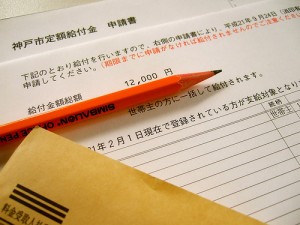As part of an economic stimulus package, the Japanese government is spending two trillion JPY for cash handouts to boost consumer spending. To put it simply, all Japanese citizens and those registered as residents all Japanese citizens in the Basic Resident Register and those registered in the Foreign Resident Register will receive 12,000 JPY, or 20,000 JPY for those under 18 or over 65, once they've lodged their application forms.
Local municipalities are in charge of the administration, an unwelcome increase in workload that coincides with the change of the fiscal year. As of mid-April, around half of the municipalities have sent out application forms to their residents. Soka City in Saitama Prefecture and Obu City in Aichi Prefecture offer English translations of the program overview.
Bringing to mind a similar program conducted in 1999 that is now commonly regarded as a failure, the program is highly unpopular with the public, mainly because the actual economic effect is unclear. The government expects an increase in real consumption expenditure by 0.2%, but there seems to be no clear consensus on how much of the two trillion yen will actually go to new spending. Predictions range from 20% to 60% and everything in between.
For the past couple of months, polls have shown that many Japanese view the program as a clumsy and condescending ploy to gain ratings by the Aso Cabinet.
At Yaruo's blog — whose post on the subprime problem was recognized at 2008 Alpha Blogger Awards– the two ASCII characters Yaruo and Yaranaio, talking about the government's initiative, say:
そんなの決まってるお!選挙のために大した効果もないのに2兆円もバラまいて支持率を上げようとしてるんだお!
なるほど。予想通りの解答だな… じゃあ聞くが、国民の半分以上が評価していない定額給付金を実施して 本当に支持率は上がると思うか
Yaruo: That's what I thought you'd say. Let me ask this, do you really think that his approval ratings will increase with the execution of a program which more than half of the Japanese are against?
Coupled with other factors however, including highway toll discounts, it just might be working. Recently, Asahi Shimbun has reported that Prime Minister Aso's approval ratings have risen 4% to 26% since March.
Blogger tetsu makes a pun on Teigaku kyufu kin(定額給付金), which literally translates as ‘handouts of a fixed amount’.
本来なら「低額還付金」とか命名するべき。最も正確には「無駄に取り過ぎてた税金を、支持率が2割切った与党が苦し紛れに現金をばら撒こうって思いついた稀代の愚策金」だな。
くれぐれも間違えないように。定額給付金は“もらう”んじゃないよ~。“ちょっぴり返してもらう”だけだよ~。
Make no mistake! We're not ‘receiving’ handouts. We're simply ‘getting some of it back’.
At the end of the day, money is money. This comment by Kentaro Takekuma illustrates the general feeling of ambivalence surrounding this policy:
得したような、でも考えてみれば原資は税金なのだから、単に取られたものの一部が還付されるだけであり、どこまでも微妙な気分です。とりあえず、くれるものはもらってしまえという、庶民としてはしごく当たり前の行動に出てしまいましたが。







